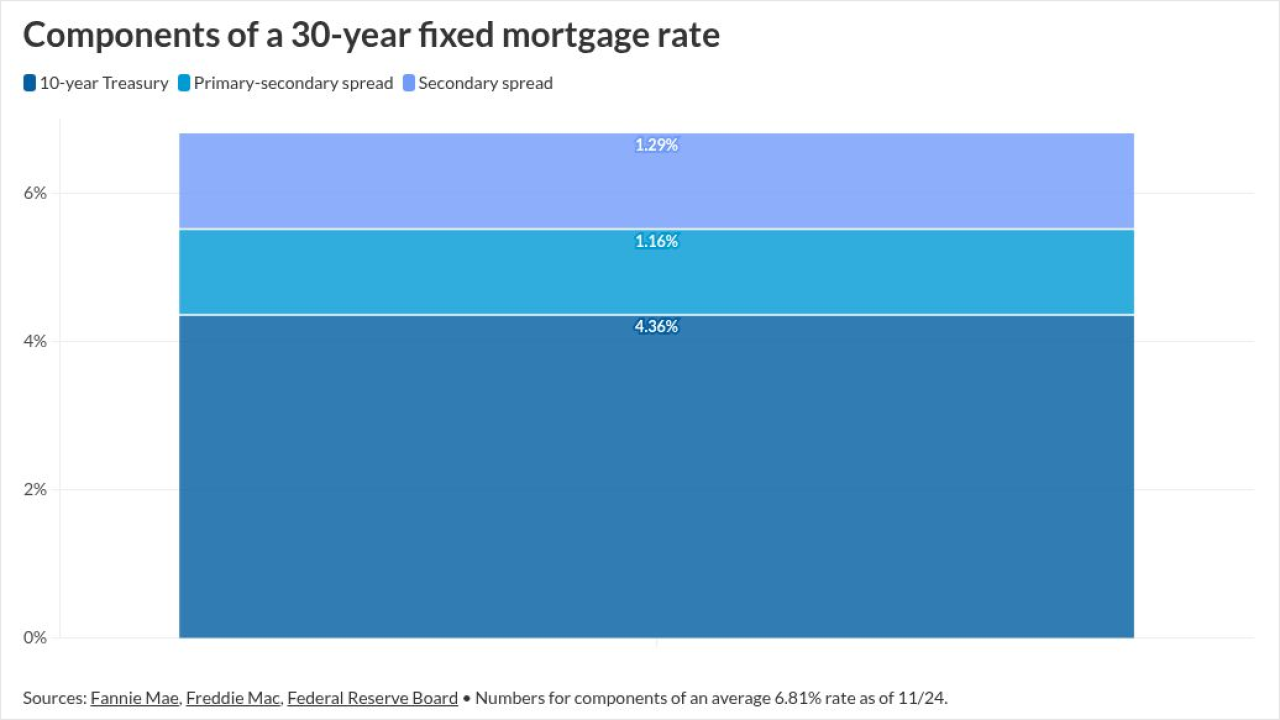Non-qualified mortgage loan securitization was one of the fastest-rising sectors when it came to private-label activity in 2018 and 2019.
For 2020, it is already gaining steam.
Five MBS pools of predominantly non-QM mortgages have been launched into the market by originators and loan aggregators, according to ratings agency presale reports published since Monday.
Annaly Capital Management, Deephaven Mortgage, Carrington Mortgage Services, DLJ Mortgage Capital and Starwood Non-Agency Lending are each sponsoring portfolios of mostly non-qualified mortgages with combined outstanding pool balances of $1.93 billion.
That total adds to the year-to-date issuance of $1.86 billion in mortgage securities, according to MBS research from Deutsche Bank published Tuesday. The deals from January through early February included those placed by originators and loan aggregators such as NewRez, Angel Oak Capital Advisors, Caliber Home Loans, Invictus Capital Partners and Seer Capital Management.
The first five non-QM deals of the year represent a 14% share of the $13.1 billion in year-to-date non-agency mortgage securitizations through Feb. 11, which has surpassed the $8.5 billion priced in the same period a year ago.
After surging to $14 billion in 2018 from $3.7 billion in 2017, non-QM securitizations last year topped $25 billion, according to S&P Global Ratings. Deutsche Bank has projected a $30 billion-plus volume for non-agency RMBS deals in 2020, due to continued low interest rates and more lenders entering the sector.
Another factor: the expected elimination of the non-QM patch. Since 2014, the Consumer Financial Protection Bureau has provided an exemption to qualified-mortgage standards for GSE-backed loans — allowing those purchased by Freddie Mac and Fannie Mae to hold a conforming status regardless of whether they meet Dodd-Frank ability-to-repay standards.
The CFPB’s 43% debt-to-income cap is applied only to private lenders’ originations in determining qualified status. The CFPB is expected to let that patch expire in January 2021, in a move that market observers believe will boost the level of non-QM MBS issuance further this year.
Deutsche said non-QM issuance is growing amid a “virtuous circle” of expanded investor interest and confidence in the private-label RMBS 2.0 sector. Newer deals have attractive spreads relative to other short-term ABS assets, and carry better structural investor protections than precrisis RMBS deals, according to the report.
“AAA [rated] RMBS offer a rapidly de-levering structure, significant structural enhancements compared to RMBS 1.0 and a wide spread for a short duration product,” the report stated.
Investors are also finding that non-QM collateral does not revolve around nonprime borrowers, Deutsche’s report noted. Lending in the non-QM sector “mostly targets alternative doc borrowers and investor properties, rather than pure credit-impaired borrowers,” wrote Deutsche analysts Ed Reardon and Andrea Andric.

Because of growing origination volume, Deutsche believes lenders could create more deals with larger pools of loans and longer deal shelf life, although current deals remain in the $350 million to $400 million range.
The non-QM sector is part of the nonagency RMBS universe of non-conforming loans made up of prime jumbo, re-performing and nonperforming, seasoned performing and other nonprime loans.
Deutsche Bank says the largest sector of nonagency volume (25% of the 2020 market so far) stems from credit-risk transfer securitizations by Freddie Mac and Fannie Mae. Those CRT deals are structured to shift government risk from GSE-backed loans to private investors.
The CRT notes reference large pools of loans on the GSEs’ books, and are issued from each agency’s respective risk-transfer platforms — Freddie’s Structured Agency Credit Risk Transfer program and Fannie’s Connecticut Avenue Securities shelf.




